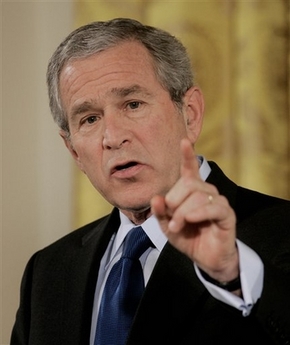WASHINGTON - Acknowledging painful losses in Iraq, President Bush said
Wednesday he is not satisfied with the progress of the long and unpopular war,
but he still insisted the United States was winning and should not think about
withdrawing.
Thirteen days before elections in which Republicans fear Iraq could cost them
control of the House or Senate, Bush expressed unwavering confidence in Defense
Secretary Donald Rumsfeld, the US generals running the war and Iraq's prime
minister, Nouri al-Maliki, despite new strains between Baghdad and Washington.
|

President Bush speaks during a news conference, Wednesday,
Oct. 25, 2006, in the East Room of the White House in Washington.
[AP]
|
"The ultimate accountability rests with me," Bush said of Iraq. "If people
are unhappy about it, look right to the president." He spoke in the East Room at
an hour-long news conference dominated by Iraq questions.
Despite polls suggesting a Democratic takeover of at least the House, Bush
said he was confident Republicans would prevail. Dismissing Democrats' hopes,
Bush said, "We've got some people dancing in the end zone here in Washington,
D.C. ... measuring their drapes."
Now in its fourth year, the war is the top campaign issue. A majority of
Americans are opposed to Bush's handling of Iraq, and increasing numbers of
Republican candidates have signaled impatience with the president's policies as
US deaths have climbed above 2,800. Bush indicated he shared the public's
frustration even as he pushed back against calls for troop withdrawals.
"I know many Americans are not satisfied with the situation in Iraq," he said
in a lengthy statement before taking questions. "I'm not satisfied either."
October has been the deadliest month this year for American forces, and the war
soon will have lasted longer than US involvement in World War II.
"The events of the past month have been a serious concern to me and a serious
concern to the American people," the president said.
Bush said the United States was changing tactics to deal with circumstances
in Iraq but shouldn't change the overall direction of the war.
"Absolutely we're winning," the president asserted.
Bush voiced confidence in al-Maliki, calling him "the right man" for Iraq
now.
In Baghdad, the Iraqi leader took a hard slap at the United States for a raid
by U.S. and Iraqi forces on the stronghold of a Shiite militia led by a radical
anti-American cleric on whom Al-Maliki relies for political support. Al-Maliki
said the raid "will not be repeated."
Al-Maliki also criticized the top US military and diplomatic representatives
in Iraq for saying his government needed to set a timetable to curb violence in
the country. "I affirm that this government represents the will of the people
and no one has the right to impose a timetable on it," he said.
Bush said he had asked for a transcript of al-Maliki's remarks before coming
into the East Room. Al-Maliki was correct in saying mandates could not be
imposed on Iraq, Bush said. He suggested there had been a miscommunication
between U.S. and Iraqi officials.
Despite criticism that al-Maliki has failed to stop sectarian violence, Bush
said, "We'll push him, but we're not going to push him to the point where he
can't achieve the objective." At the same time, Bush said Iraq's government
"must respect the fact that we've got patience, but not unlimited patience."
Democrats said Bush's appearance was evidence that the war had shaken voters
and the administration needed to salvage its reputation on national security.
Sen. John Kerry, D-Mass., called the news conference an election-season
"performance" to "convince Americans he has a plan for Iraq. But the president
can't sell what he doesn't have."
Senate Minority Leader Harry Reid, D-Nev., accused Bush of changing his tune.
"One day, our senior military leaders indicate more troops may be needed, the
next day the president discounts that option. One day, it's stay the course, the
next day it's change the course."
Bush rejected Democratic calls for a timetable for troop withdrawals.
Currently there are 144,000 US forces in Iraq.
"We cannot allow our dissatisfaction to turn into disillusionment about our
purpose in this war," the president said.
He said a fixed timetable for withdrawal "means defeat. You can't leave until
the job is done." Bush said he would send more troops if Gen. George Casey, the
top US commander in Baghdad, said more were needed to win. A day earlier, Casey
said he might need an increase in U.S. forces in Baghdad to stop the rising
bloodshed.
"We're winning and we will win, unless we leave before the job is done," Bush
said. He said Rumsfeld ¡ª whose resignation has been urged by some Democrats and
Republicans - had done everything asked of him. "He is a smart, tough,
capable administrator," the president said.
Bush said he looked forward to a report after the election from a blue-ribbon
commission exploring U.S. options in Iraq. Bush said he would consider any
option but cautioned, "The road to victory will not be easy. We should not
expect a simple solution."
On other subjects, Bush said:
- He has not given up on trying to win immigration, Social Security and tax
reform legislation. He said there was a better chance of getting them through a
Republican Congress rather than a Democratic Congress - although it hasn't
worked out that way yet.
- North Korea was trying to test the will of five countries that are aligned
in negotiations to pressure Pyongyang to abandon its nuclear weapons. Earlier,
North Korea warned South Korea it would "pay a high price" if it joins the
US-led drive to punish North Korea for its nuclear test. "The leader of North
Korea likes to threaten," Bush said.